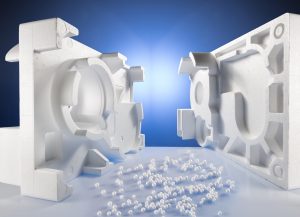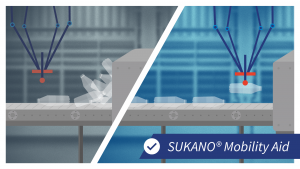
A look at some resonating new resins
Canadian Plastics
Materials PackagingWhen it comes to food packaging, plastic is almost always a better material to choose than the alternatives. And speaking of better, here are some of the newest plastic resins and additives designed for both rigid and flexible applications.

The new Styropor P 24 Speed packaging raw material from BASF is designed for easy manufacture of thin-walled technical foam moldings, as well as cool boxes and food packaging. Photo Credit: BASF
Charles Dickens coined the phrase “it was the best of times, it was the worst of times” to describe life during the French Revolution. Fast forward to today and it’s not a bad way to sum things up for the plastics packaging industry. On the one hand, there’s a global battle against single-use plastics, particularly when it comes to the once-ubiquitous plastic bag, with at least 127 countries across the globe now having adopted some form of legislation to regulate plastic bags. But on the other, plastic has still managed to become one of the most popular packaging options, and plastic containers and bottles are in greater demand in the food and beverage industry than any other material.
Which is why, depending on the region, packaging applications account for between 35 to 45 per cent of polymers produced in total. And since this trend shows no signs of slowing down, material suppliers both big and small are introducing new resins and additives designed to enable the most cutting-edge rigid and flexible food and beverage packaging applications.
STAND-UP IS ON THE RISE
The market for stand-up pouches is growing at approximately three times the rate of that of flat packaging, depending on the region. With that in mind, A. Schulman Inc. has introduced Polybatch-brand EasyPour additive masterbatch concentrates, designed to optimize packaging’s inner surfaces. Adding the masterbatch to the inner layer of a multilayer structure ensures the contents flow smoothly, making it easier to empty the package. “It’s a struggle to empty stand-up pouches, tubes or bottles,” said Ralf Küsters, the company’s product and market development manager. “There’s always something left inside, and no one likes that.” The new masterbatch technology is designed for use in both flexible and rigid multilayer constructions. Formulas are customized using specialized test methods in order to optimize performance for a given packaged substance. To back up the innovation with numbers, A. Schulman developed a test to measure the speed and distance of the product on a tilted surface, as well as the amount of residue on that surface afterward. It showed a pouring improvement of up to 25 per cent. The testing system in place allows brand owners to appraise products themselves to see how well they work and adapt them to their particular needs.
PS is a versatile plastic that can be rigid or foamed. General purpose PS is clear and hard, with a relatively low melting point. Typical food packaging applications include bottles and food containers. Rounding off BASF’s EPS range for the food packaging industry, the company has developed a new plastic grade which has approximately 4.8 per cent lower pentane content, reducing the molding cycle and intermediate conditioning times. The new grade Styropor P 24 Speed has a density of 25 grams per litre, the company said, resulting in up to 50 per cent shorter mold cycle times when compared with BASF’s established Styropor P 326. The new type of Styropor has a high mechanical resistance, superior flexural and compressive strength similar to the classic Styropor P 26, and good fusion properties and a smooth surface finish. Styropor P 24 Speed, similar to all Styropor packaging grades, is without flame retardant, and is available in three bead sizes ranging from 0.4 to 1.3 mm. LDPE is used predominately in film applications due to its toughness, flexibility, and relative transparency, making it popular for use in applications where heat-sealing is necessary.
A new silicone-based slip additive masterbatch for LDPE film that reportedly optimizes form-fill-seal (FFS) flexible packaging production has been launched by Dow Performance Silicones, a global business unit of DowDuPont Specialties Products division. According to Christophe Paulo, Dow Performance Silicones industrial and consumer strategic marketer, the company’s MB25-235 masterbatch significantly reduces the coefficient of friction for LDPE film and also addresses the traditional drawbacks of organic additives by delivering stable, long-lasting slip performance and avoiding migration to the film surface. “MB25-235 is based on advanced silicone slip technology that helps to boost production speed, maintain uninterrupted throughput, and ensure uniform film quality,” Paulo said. “Unlike organics, it will not migrate to the film surface, and is also cost-effective as it only needs to be incorporated into the outer layer of multilayer films, which reduces the amount required.” MB25-235 is approved for food contact under FDA, EU, and Chinese regulations, Paulo added.
GETTING EU COMPLIANT
A new line of ABS compounds under the brand Chemical Compliance (CC) for food packaging applications has been launched by Spain’s Elix Polymers. All components in Elix’s ABS CC compounds are said to be compliant with health-related regulations such as EU10/2011 (Plastic Materials for Food Contact Applications), which already set the maximum limits of substances that are considered safe. Grades have been formulated for individual applications, enabling customers to select the materials based on their specific needs. Two injection molding grades — P2HCC and P3H-CC — are said to be easy to process, and have high levels of brightness as well as intense colours. Elix also supplies extra services like migration testing, development of compliant colours, additional quality controls for these compounds, and technical support during processing as an added guarantee that customers are following best practices and to ensure that there’s no contamination or degradation of the compounds.
An innovative new TPE technology from Kraiburg TPE that features superior adhesion to nylons also complies with EU10/2011. The compounds that comprise the company’s new FC/AD/ PA Thermoset K series are said to provide very good processability and superior surfaces that don’t require any finishing after leaving the mold. “The materials can be injection molded directly onto nylon 6 and nylon 6/6 without any additional adhesive primer,” said Dirk Butschkay, Kraiburg’s product marketing manager. With hardness degrees ranging between 40 and 80 Shore A, they combine tactile properties such as soft-touch and nonslip grip even at low wall thicknesses, Butschkay continued, and they also provide superior tensile strength, elongation at break, and abrasion resistance.
IMPACTFUL COPOLYMERS
PP has good chemical resistance, is strong, and has a high melting point, which makes it a good choice for hot-fill liquids. Sabic recently extended its Flowpact series of impact copolymers with the new PP FPC70 grade for rigid packaging. Rigid packaging made with this high-flow (MFR 70) resin, including applications that can be hot-filled, is said to have much higher top-load strength than identical products made with benchmark materials, resulting in better stackability for better transport and storage economics. “FPC70 boasts polymer chemistry advances that yield a material with a balance of high stiffness, impact strength, and high heat distortion temperature, unlike a standard PP impact copolymer,” said Lada Kurelec, global business director, PP, for petrochemicals at Sabic. “We believe that PP FPC70 answers the continuing trends in thin-wall packaging by enabling up to 10 per cent thinner walls and fast injection, which reduces energy consumption and increases productivity.”
PET is clear, tough, and has good gas and moisture barrier properties, which is why it’s commonly used in beverage bottles and many injection molded and blow molded consumer product containers. Sukano Polymers has introduced a mobility aid additive masterbatch for injection stretch blow molded (ISBM) PET bottles that’s designed to enable bottle makers and brand owners to run their conveyor belt systems and production robots without the need for a spray coating. The Sukano Mobility Aid solution, believed to be the first commercially available for this application, is provided as a solid PET masterbatch and can be used for virgin PET or RPET material during molding or processing. The product is said to produce a silicone-like mobility aid effect in PET, yet is engineered to preserve material clarity with minimal impact on haze. According to Sukano research and development global head Michael Kirch, the new masterbatch is well-suited to clear, translucent, and coloured bottles produced for food and beverage applications, as well as personal care, household and cleaning, and cosmetics products. “It’s also widely applicable, as PET material containing the new masterbatch can be run on existing ISBM bottle production equipment without modification,” Kirch said. “Bottle makers and brand owners can now run their conveyor belts without interruption and minimize the mispicks by production robots, which improves productivity and maximizes yields.”

Sukano’s Mobility Aid additive masterbatch enables PET bottle makers and brand owners to
run their conveyor belt systems and production robots without the need for a spray coating. Photo Credit: Sukano
When it comes to materials innovations for food and beverage packaging applications, this might indeed be the best of times.
